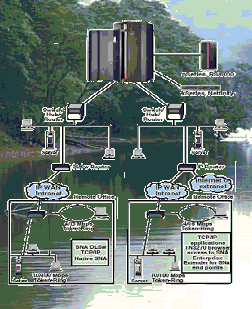 "System level" or more precisely "control level" software is the opposite of "user level" software. The easiest examples to find, "control level" software include operating systems (OS), such as Windows, Linux, z/OS etc. Also part of the system or subsystem, such as TCP/IP servers, device drivers, etc.
"System level" or more precisely "control level" software is the opposite of "user level" software. The easiest examples to find, "control level" software include operating systems (OS), such as Windows, Linux, z/OS etc. Also part of the system or subsystem, such as TCP/IP servers, device drivers, etc.
Meanwhile, easy examples of "user level" software include spreadsheets, word processing, banking systems, credit card systems, etc. You have to be careful about the term "system" here, it seems ambiguous if the above is not replaced with the term "control".
In general terms, "control level" software is software that is more oriented towards control management rather than data processing. Meanwhile, "user level" software is the opposite, more data processing oriented.
In terms of human resources, building "control level" software must really have in-depth knowledge of computer architecture and memory manipulation and mapping skills in binary and hexadecimal. Meanwhile, to build "user level" software what is needed is in-depth knowledge and data processing skills that will be projected in the software that will be built.
What NSI produces is automation, namely console automation, automatic workloads scheduler and automatic spool downloader, all are "control level" software. As a startup, NSI certainly adapts its existing potential, namely in the field of software "control level". After all, it looks like players in this region are still giving it a chance. At least it has been proven that NSI can get customers.
Today data processing has shifted to knowledge processing, and has even entered the era of artificial intelligence (AI). Humans can chat with computers through AI. Vehicles have also started to be equipped with robots to be able to park themselves, to brake themselves when suddenly there is an object blocking or crossing the road. Soon, our cars will be able to drive themselves, so we the owners just have to sit and play with gadgets or sleep, and the next thing we know we have arrived at our destination.
In the next few years, there may no longer be a need for private cars. Maybe it's the same as when we have a Gojek or Grab account, log in then order and suddenly a car comes to pick us up. The difference is, in the future, what will come will be cars without drivers, but able to drive according to our commands. If there is a problem or damage or the battery charge runs low on the road, a replacement car will automatically come.
Meanwhile, mobility doesn't always have to be physical. Because almost all services and work can be done online. Of course, obstacles resulting from the rigidity or stupidity of regulations such as BPJS which can only be used in the city/district itself must be immediately adapted to future situations.
In short, if we look to the future, where all aspects of life will be converted to technology and synchronized and automated, of course the role of "control level" software will become increasingly important.